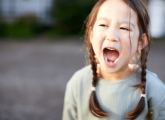Tamsin Grimmer explores how to support young children with their big emotions…
We all have days when we feel out of sorts, or our circumstances change, turning a good day into a stressful one.
At these times our emotions can get the better of us and we feel less than in control. We are dysregulated and need every ounce of self-regulation to remain calm and refrain from doing or saying something we shouldn’t!
Some people refer to this increased rush of stress hormones as being in a state of ‘fight, flight or freeze’. When this happens, we are unable to think rationally until we return to a state of calm.
Sometimes self-regulation is not totally understood by those working within early childhood education because it’s regularly equated with children simply controlling their behaviour. Although this is part of the story, in reality, self-regulation is more complex with both cognitive and emotional elements.
Cognitive regulation enables us to plan, make decisions, use executive functioning skills and remain flexible in our thinking, whereas emotional regulation is about managing our powerful thoughts and emotions in order to regain feelings of calm when stressed or overly emotional.
As adults we develop ways of overcoming this stressful state, for example, through taking a deep breath or counting to 10. However, children don’t yet know how to deal with these feelings.
Part of our role as educators is to help children regulate their emotions by becoming a co-regulator and actively listening and remaining attuned to their emotional states.
Co-regulation relies on a foundation of warm, responsive and trusting relationships between adults and children.
Adults need to provide a stable environment with a consistent routine and predictable boundaries to help children feel safe and secure.
When adults interact in the moment, coach and role-model instruction to scaffold children’s learning, they are acting as a co-regulator by helping children to regulate their emotions and teaching them strategies to use in the future.
When children experience big emotions, we need to offer calm and continuous reassurance, support and warmth whilst simultaneously developing their emotional intelligence.
We can do this by talking about emotions, sharing stories which describe a character’s thoughts and feelings, and engaging in role play and pretence play which encourages children to adopt different perspectives.
Research indicates that children who are able to self-regulate are well-adjusted, socially competent, cognitively more able and ultimately more successful in life.
So, our role in co-regulating and supporting children to develop self-regulation is growing citizens and shaping society for the future! No pressure!
Tamsin Grimmer is an early years consultant, trainer and author. Visit: tamsingrimmer.com or follow Tamsin on Twitter: @tamsingrimmer

Noise levels – How to keep them down in Early Years
Editors picks
